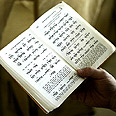
Kabbalah book
Photo: AP
Most people have heard something or other about Kabbalah. But it is highly unlikely that what is going around in the general marketplace posing as Kabbalah is anywhere close to the real thing.
What most people have been exposed to is a smorgasbord of pop psychology and self-help that pretends to have some connection to Jewish mysticism, but it rarely, if ever, does.
It is easy to see how people are fooled. In most disciplines, you expect to know and understand something after studying it. But when it comes to mysticism, people expect to be mystified. So they are willing to accept incomprehensible mumbo-jumbo. Kabbalah is supposed to be mysterious and enigmatic. It's mysticism after all.
So much nonsense is presented in the name of Kabbalah, it is important to have some sort of forum where people can find the basic understandings that they crave.
In this series, we will attempt to present the central ideas of Jewish mysticism in a methodical and intelligent manner, minimizing abstruse terminology and shying away from a sense of the incomprehensible.
What kabbalah is and isn't
In order to understand what Kabbalah is and what it isn't, let us use the following illustration.
A researcher sits in his lab examining all sorts of atomic phenomena. He smashes atoms at great speeds, and records what he sees happening. He is very meticulous in his work, and may even draw some immediate conclusions from the data at hand. But he leaves it at that.
A great scientist picks up these notes, reads them and ponders their meaning. He begins to construct a mega-picture. He tries to envision what the entire system may be like. He knows that there are no instruments, nor can there be, to actually see the particles he imagines, and therefore he gropes for metaphors that will accurately connect the bits of data that the physicist collected. Thus, he begins to speak of "super strings," "atomic tunnels," "energy bridges," and "ten dimensions."
A third person, who has a highly fertile mind but with no sense of science, is eavesdropping, his imagination has been fired and, in no time at all, he is carrying forth about people that have mysteriously disappeared in "atomic tunnels," and unlimited sources of energy contained in various of the "ten dimensions."
These three people illustrate the different approaches to kabbalah.
The "data" or facts that kabbalah deals with are the narrative of the Torah, and its entire body of religious law. The "researcher" represents a person who sees the laws and narrative as they are, understands their immediate meaning, but does not get the larger picture.
The "great scientist" represents the kabbalist who sees the various local points and then begins to get a feel for the greater picture. He needs metaphors to describe the abstract unity he perceives, and he is aware that this tool is likely to be vague and only approaching the understanding that he has acquired. Although limited by the tools at his disposal, the complex picture the great scientist communicates can still give us a sense of the reality that he is grappling with.
And then there is the pseudo-kabbalist - "the eavesdropper" - whose kabbalah is basically unrelated to Torah, except perhaps as a springboard for his imagination. He has discovered "sources of energies," "divine emanations," and ways to "expand consciousness," but it all stems from his fanciful illusions.
In summary
Kabbalah is to Torah what philosophy is to science.
Like science, the Torah gives us the facts that are fully perceived sensually and rationally quantifiable.
Like philosophy, Kabbalah gives us the grander abstract picture that the facts present.
The upcoming segments of this series will be exploring some of the fundamentals of Kabbalah.
Rabbi Leiberman is a leading Jewish educator in Israel and abroad, and has written a number of works on Jewish thought and kabbalah. Reprinted with permission of Aish















